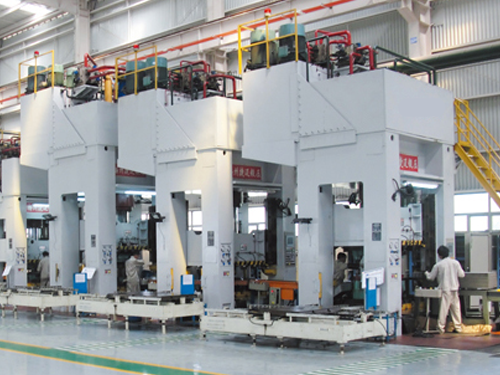Metal heating & Forging cooling
We often trim the metal in pieces and heat it to processing temperature with heaters. Finally, we start the process of forging. Cooling process are as below:
- Metal electric heating equipment
- Forging oil hydraulic system (Mechanical or air pressure)
Cooling of electric heating is common in metal heating equipment. However, cooling water quality is difficult to control. Therefore, it is necessary to install a plate heat exchanger between cooling circuit for electric heating and cooling tower. For the forging oil hydraulic system, oil hydraulic equipment with higher pressure shapes the heated metal. The oil box temperature of forging machine would rise up during this process. At this time, using cooling tower to lower temperature with shell-shape heat exchanger to proceed in heat exchange is required.
How does limescale affect the performance of forging cooling?
In general, forging cooling that utilizes plate type and shell-shape heat exchangers takes out the heat energy produced by metal electric heating system and forging oil hydraulic system for lowering temperature to operate stably. Among many cases we serve, the calcium and magnesium ions would produce chemical reaction during the heat exchanger process, and then creates limescale deposited on heat exchanger pipes. For months or years afterward, limescale becomes more and more and finally cause many problems:
- Poor heat dissipation caused by limescale blocked on heat exchanger
- Heat exchanger need acid-washing
- Frequent machine shutdown due to the improper heat dissipation
In our experience, customers always do water quality control and limescale prevention. The common handling methods as below:
- Regular cleaning for cooling tower
- Using filtered water or soft water
Both are the common methods for lowering Calcium Carbonate Concentration contained in water. Nevertheless, cooling water is evaporated when cooling tower operates. To ensure sufficient water volume, the motor extracts water to supply new water but result in:
- The increase in water calcium carbonate concentration
- Large amount of CaCO3 enters into heat exchanger and accumulate
- The effect of regular cooling tower cleaning cannot catch up the speed of calcium formation
Because of these reasons, Jin Hui often suggest that customer use our closed circuit cooling tower. The biggest benefit of using closed circuit cooling tower is to isolate impurity from outside, making sure that pollution won’t get into the interior heat exchanger to cause the limescale blockage.
How does limescale affect the performance of forging cooling?
The main difference between closed circuit cooling tower and general open cooling tower is that cooling water is divided into inner water and outer water. The interior heat exchanger has separated cooling water into inner water (for forging) and outer water (for cooling tower) to ensure that cooling water for forging or heating equipment is always clean. In that case, we only need to clean one cooling tower for maintenance instead of cooling circuit pipes or equipment. Here are some maintenance methods:
- Regularly open the interior for cleaning
- Regularly clean filling to get rid of limescale
- Able to clean limescale on water distribution tube
- Regularly clean the water basin to lower mineral concentration
For further information with regard to advancing cooling system, please contact Jin Hui Cooling Server +886-4-2693-7836. Jin Hui will provide you with suitable limescale solution!









